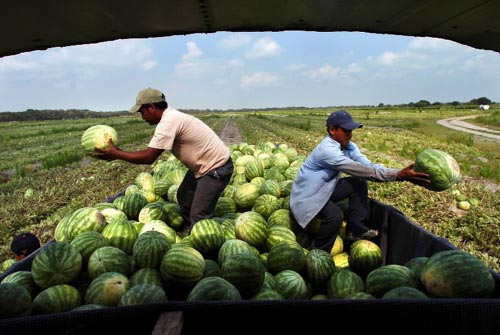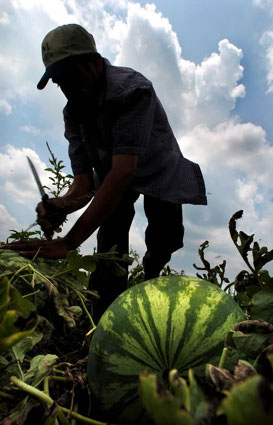By Wes Smith
Sentinel National Correspondent
IMMOKALEE — Gerardo Reyes Chávez, 25, sat atop a desk against a mustard-colored wall surrounded by images of Che Guevara, Robert F. Kennedy Jr., Martin Luther King Jr. and Our Lady of Guadeloupe.
He held up a drawing of the Statue of Liberty and spoke of its history and symbolism to nearly 30 migrant farmworkers from Mexico, Guatemala and Haiti.
“It is sad when you hear that an immigrant represents something dirty or bad or negative because when you go back and think of the Statue of Liberty, you learn that so many people came just like we did to this place,” said Chávez, a native of Zacatecas, Mexico.
“And what did they come for? They came looking for freedom, a new life — and for work.”
Those basics often have been hard to come by for migrant workers who harvest fruit and produce each year in Florida and across the nation. But this spring, the humble organization created by the laborers — the — won what many consider a major victory.
Their nearly four-year boycott of Taco Bell ended with one of the nation’s largest fast-food chains agreeing to pay a penny-per-pound increase to nearly 1,000 workers who harvest tomatoes for their suppliers. That marks about a 75 percent increase over the usual rate of 1.3 cents per pound.
More importantly, the fast-food chain’s parent company agreed to lead an industrywide effort to provide greater protections for migrant workers, who are excluded from many of the legal rights and benefits given other laborers in the United States.Activists start phase 2
The Immokalee activists now have launched the second phase of their campaign, with letter-writing barrages aimed at enlisting McDonald’s, Burger King and Subway in the reforms.
“The coalition is a remarkable human-rights group doing impressive work at a grass-roots level, and I think there is real substance, as well as symbolism, to their victory,” said Terry Coonan, director of the Center for the Advancement of Human Rights at Florida State University.
“It shows how the farmworkers have come of age,” he added.
The South Florida advocacy group formed in 1995 after a strike by 3,000 workers in Immokalee. Leaders in the migrant community united to ease tensions among laborers of different nationalities, and to demand better treatment from employers who have manipulated, intimidated and enslaved them in the past.
Unlike other labor groups in the United States, most Florida migrant farmworkers have no health benefits, sick leave, paid vacations or pension plans. They also don’t have the right to form unions.
The coalition acts much like a union. The small but influential group has been a unifying force among hundreds of thousands of diverse and often competing workers, who often cannot understand one another’s languages or dialects.
Nearly 2,500 of the laborers carry coalition membership cards as they migrate to the Midwest after the harvest each year.
“If something happens and you are being accused or exploited, you can take out the card and say you are a member of our coalition. The struggle doesn’t end when you leave Immokalee,” Chávez, a coalition staff member, told workers last month before joining them in Arcadia’s watermelon fields.
The group’s headquarters in the back of its small cooperative grocery serves as a refuge for migrants in a hard-edged transient place, a poor work camp seemingly dropped into a rural farm community of 20,000 amid Southwest Florida’s swamplands.
Most field workers live within a few blocks of the town’s center in a multinational barrio of rented shacks and mobile homes. Buses pick them up for the fields near dawn each day and return them in the late afternoon. Because weekly rents are $200 or more, a dozen workers often share a single dwelling. Most are men who send their earnings home to relatives.
Florida’s tomato pickers typically earn less than $8,000 a year, according to the coalition. They have been paid about 40 cents for each 32-pound bucket. At that rate, it takes 2 tons of tomatoes, or 125 buckets, to earn $50 a day.
Forty-five years ago, Immokalee served as a setting for Edward R. Murrow’s groundbreaking documentary Harvest of Shame, which focused on starving farmworkers, at the time mostly blacks.
Though most migrant workers are Hispanic now, and starvation is rare, coalition leaders still refer to Immokalee as “ground zero” for modern-day slavery because of labor and human-rights abuses. Yet, because of the coalition’s efforts, the town increasingly is known worldwide as a training ground for worker advocates and young activists.
“Immokalee to a lot of people is a reality check,” said Brie Phillips, 22, of St. Louis, Mich. “You can’t come here and not go away with a different view about the reality of life for people in America. If you weren’t questioning things before you came here, you are when you leave.”
Boycott began in 2001
The coalition’s goal in launching the Taco Bell boycott in 2001 was to improve wages and stop abuses against farmworkers by pressuring the fast-food chain to use its influence with produce suppliers who employ the laborers.
The efforts were fended off initially by Taco Bell and its parent company, Yum! Brands, which also owns KFC, Pizza Hut, A&W Restaurants and Long John Silver’s.
The company’s position was that it purchased tomatoes from independent suppliers whose mistreatment of workers was “unrelated to Taco Bell.” The fast-food chain also contended that it lacked influence because it is not a major buyer of Florida produce.
Taco Bell purchases 10.9 million pounds of Florida’s annual 1.45 billion-pound tomato crop, according to the company.
Using its sophisticated Web site (ciw-online.org) and the Internet to build support, the coalition increased pressure, targeting Taco Bell’s primary customers in colleges and high schools nationwide.
Students at 300 colleges and universities and more than 50 high schools participated in the boycott. They shut or blocked the chain’s restaurants on 22 campuses.
Human-rights and faith-based organizations were also drawn to the coalition’s cause, including the National Council of Churches, which represents 45 million Christians.
The coalition’s “Boot the Bell” campaign included cross-country bus trips, protest marches, campus demonstrations, hunger strikes, church meetings and confrontations with corporate officials.
In March, Yum! Brands, based in Louisville, Ky., offered to work with the coalition to end the boycott, though the corporation’s news releases continued to deny that it was having an impact on sales, referring to the boycott as a “misinformation campaign.”
Emil Brolick, president of Taco Bell, issued a statement recognizing that Florida tomato workers “do not enjoy the same rights and conditions as employees in other industries, and there is a need for reform.”
 Taco Bell, which has annual sales of more than $5 billion, agreed to the group’s demands to improve wages by a penny a pound. Officials have estimated that the company will pay the Florida tomato growers an extra $100,000, without passing the cost to customers.
Taco Bell, which has annual sales of more than $5 billion, agreed to the group’s demands to improve wages by a penny a pound. Officials have estimated that the company will pay the Florida tomato growers an extra $100,000, without passing the cost to customers.
The Mexican-themed fast-food chain also plans to adopt a code of conduct that calls for Taco Bell to sever ties with suppliers who abuse workers.
“It really is an historical agreement because for the first time, a fast-food company is recognizing the role of farmworkers in the supply chain for the products they sell to American consumers,” said Steve Lize, 29, a Chicago social worker who joined the boycott.
Former President Carter was among those who sent congratulations, along with Eric Schlosser, author of the best-seller Fast Food Nation, who encouraged the Immokalee group to target other fast-food companies next.
The coalition has done just that, notifying corporate officials at McDonald’s, Burger King and Subway that their companies will be called upon to follow Taco Bell.
“The real significance of this agreement lies in the promise it holds for much greater change in the future,” said coalition co-founder Lucas Benitez in comments posted on the organization’s Web site.
Veteran activist Romeo Ramirez, 24, who went undercover to help the FBI investigate human-rights abuses in Immokalee said the boycott’s success will make a significant difference to his fellow farmworkers, who harvest nearly 50 percent of tomatoes grown in the United States.
“It will mean that they will earn a little higher wage and that they can survive instead of struggling,” Ramirez said.
But, he added: “There has been abuses for decades, and there will continue to be abuses. This won’t solve all the problems — it is just one small step.”
Wes Smith can be reached at dwsmith@orlandosentinel.com or 407-420-5672.
Photos by Joe Burbank, Orlando Sentinel.
Copyright © 2005, Orlando Sentinel
